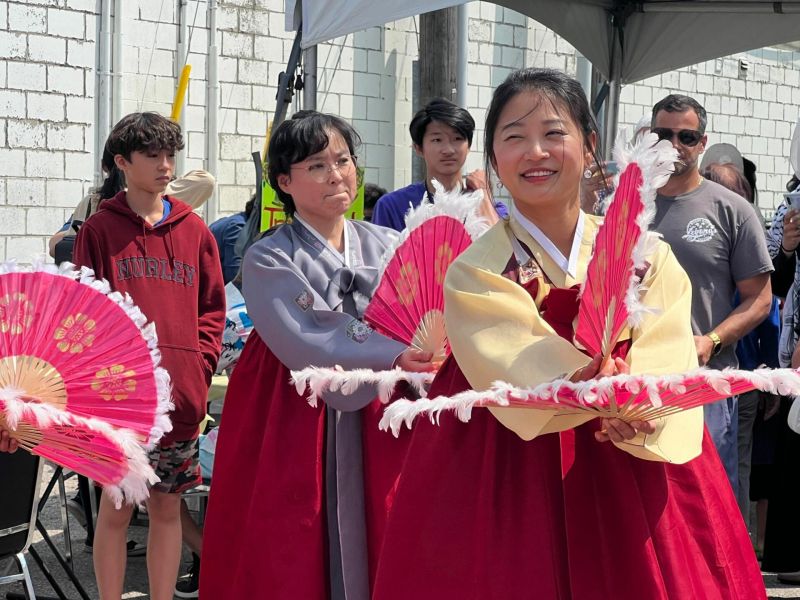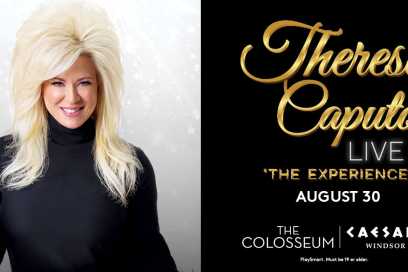Local Theatre Asks Complicated Questions In Stripped Down Play
Hello time traveller!!
This article is 413 days old.
The information listed below is likely outdated and has been preserved for archival purposes.
Known for thought-provoking plays, a local theatre company is exploring complex themes by staying simple.
Currently in the middle of a two week run, Post Productions is staging David Mamet’s The Anarchist at Shadowbox Theatre (located at 103b – 1501 Howard Avenue.) With their final performances taking place on April 18th, 19th and 20th, the company is excited to showcase its hard work on the unique two person play.
Despite trusting their vision, the show wasn’t immediately embraced by everyone however.
“First reading the play when [producer/director Michael K. Potter] said they were considering it, I really didn’t like the script,” said Mary Grace Weir, who plays Ann. “I’m not a fan of Mamet, really. But I did like last year’s production of Glengarry Glen Ross at the Shadowbox even though I didn’t like the script. So I knew [Potter] and [producer/assistant director Fay Lynn] would be able to make it into something worthwhile and trusted that. When I read it a second time, I started to see the possibilities.”
Murdering a police officer during a protest gone wrong, Cathy (Cindy Pastorius) has served 35 years of an indeterminate jail sentence. Thinking she’s reformed enough since the crime from her youth, the prisoner now believes she should be released. Conflict arises when prison administrator Ann must sign off but will stop at nothing to ensure Cindy remains incarcerated. What follows is a 90 minute conversation between the two on the latter’s final day before retirement.
Even though it isn’t Mamet’s typical fare, The Anarchist is an homage to medieval Christian morality plays. It’s also heavily influenced by philosophical dialogues by Plato and David Hume.
Resulting in strong roles and a unique voice, it still made dialogue challenging however.
“I was given the script some time ago and wasn’t sure how I felt about it,” said Pastorius. “Then, after a year off the stage, I saw Post was staging it and I figured I would audition. When [Potter] and [Lynn] offered me the role of Cathy, I was hesitant but excited. Mamet is a lot of work and the way these characters speak is not how I would speak. It was almost like memorizing Shakespeare but the character and the concept really pulled me in.”
Starting in February, part of truncated rehearsals was getting to know one another. Despite playing many well-received roles across the county, Weir and Pastorius hadn’t worked together. Growing their relationship organically, they soon became comfortable with pushing more boundaries and taking risks along the way.
It’s this openness that gave Potter the performances he was expecting when both were cast.
“Weir and Pastorius are women with a lot of natural strength of personality, an authoritative presence, a sharp and reflective intelligence, and a deep commitment to throwing everything they have into their work,” he said. “With these two actors we never have to worry about the possibility that they might give a half-assed performance, refuse to practice at home or that sort of thing.”
Using such personality also helped with chemistry and depictions of each character.
“There was a very easy chemistry from the start,” said Weir. “We have very different personalities, or perhaps ways of presenting ourselves that make the characters immediately defined from each other. She is more bubbly and earthy, I am more restrained and cerebral. So that will no doubt influence how the audience relates to and feels about the characters. Whether that is misleading or not, who knows?”
Despite this, many challenges still presented themselves. Although different elements were scaled down, having two people talk for 90 minutes required a different skill set. With no breaks for audiences or actors alike, both women memorized 33 pages of dialogue each: They also needed to maintain their focus and energy for an hour-and-a-half.
Because of this, everyone worked on finding ways to keep the crowd’s attention. Accentuating Mamet’s play with actions, Weir and Pastorius used facial expressions, body language, the space and relation to one another with set pieces and props during performances.
Even so, it still came with some obstacles.
“The language was really difficult to work with,” said Weir. “Lots of circling back and approaching the same argument from a slightly different angle. You have to keep track of which loop you are on! Some of the wording is very formal, even philosophical and making that sound natural is a challenge. In my mind, Ann is doing this deliberately to make herself seem more refined than she is – there are indications in the script that she is probably from a lower class background than Cathy. For me personally, a lot of what Ann says are short snippets or prompts to Cathy that repeat, and that can be tricky for conveying information about character and motive. I do a lot of listening and reacting, which is surprisingly challenging. I have a particular short question that I ask I think eight times in slightly different contexts – how do you keep that interesting and convey new information each time?”
Pastorius agrees the dialogue made things harder for her as well.
“This was one of the most difficult rehearsal processes I have ever been through,” she said. “I struggled with learning the lines and ended up getting sick, which made the process that much more difficult. I was getting in my head, frustrated with myself and felt like I was letting everyone down. I’m so grateful that [Potter] and [Lynn] settled me down, adjusted our opening and reminded me that I was capable and I would get there. When I finally took that pressure off myself, I was able to finally connect to what my character was saying and feeling in the moments. But Mamet — MAN! SO MANY WORDS!!”
Although it was a lot to digest, the conversation is what drives the play. As both characters trade points, The Anarchist’s revolves around the idea that everyone has two choices in life: Either submit or rebel. While Cathy has chosen the latter, Ann represents the opposite.
Set in their convictions, they must eventually face the contradictions in each viewpoint as well.
“Each woman envies and wants to be like the other in various ways,” said Potter. “Ann is a middle-manager with authoritarian power – she wields this over others but only has it because she submits to powers greater than hers. Any power she has over others depends on her submission. You can see this in Ann’s power over herself as well; she’s tightly controlled, someone who’s made great effort to mold herself into a good person as defined by the power to which she submits. Cathy came from a life of privilege, a life of wealth and luxury which naturally gave her far more power than she would have had if her family had been poor. She rebelled against her family and threw that power and privilege away in the pursuit of what she thought was a noble cause …her efforts were a failure and she ended up in prison where she has virtually no power over anything.”
Although she’s a prisoner made to submit, Cathy still has hope for earning her freedom. Converting to religion while incarcerated, the convict believes that she’s become a better person whose release is reasonable. Going so far as to present faith as a third option to choose from, the play then asks audiences to examine if it isn’t just another form of submission.
Building their relationship and tension through these questions is also key to pulling people in.
“This play is a tennis match,” said Pastorius. “There is a constant push and pull with the characters. In turn, they are both the ball and the racket. The connection between Cathy and Ann is there throughout and you see these two have a past, that there is a veiled affection, or at least appreciation for the wit, intelligence and ‘faith’ each possesses. You wonder if they could have been friends in another life. The audience will feel pulled in by their charm and punched in the face by their humanity. It will make the audience question the truth of each woman and look at their own beliefs on incarceration and rehabilitation.”
Weir agrees that it’s a major part of what pushes her own character forward throughout the play.
“One theme I find very interesting is that of self-sacrifice,” she said. “What are you willing to sacrifice for your beliefs? I starting seeing Christ-like aspects in Ann, a willingness to suffer and give up things that are important to her in order to prove her conviction that Cathy is a danger. She has already given up some things at the opening (and perhaps not deliberately), but as the play progresses, she opens herself up to being wounded in several ways to try to coax Cathy to reveal what Ann believes to be her true nature. Her professional integrity is one of the last things of importance Ann has left. Will she decide to sacrifice that as well?”
Even though most haven’t found themselves in a position similar to Ann or Cathy, Potter believes the play is universally relevant. Being able to relate with both makes it hard to classify either as a hero or villain. Instead The Anarchist focuses heavily on looking back, assessing the consequences for past actions and asking what makes someone worthy of redemption.
With neither character framed as unlikable, audiences are left to draw their own conclusions.
“I think that what people decide regarding whether Cathy should be released from prison will depend on how they respond to and perceive each of the characters,” said Potter. “Certain facts are laid out and unquestioned, but a lot of the reasoning for and against Cathy’s release is muddy and questionable. So audiences have to decide which statements and claims they find believable, which concerns they believe are valid and most importantly, what counts as evidence that someone has truly been rehabilitated or redeemed. Ultimately what people will take away from The Anarchist will depend on whether they come in believing it’s possible for people to change who they are. I think whether they believe that’s possible depends on whether they’ve ever had to try to change who they are.”
Remaining performances of The Anarchist will take place at the Shadowbox Theatre on April 18, 19, and 20. Doors for all three shows open at 7:30 p.m. with showtimes starting at 8. Tickets are $25 each and can be purchased online or at the door if seats are still available: Cash, debit and credit are all accepted.
As one of many plays in the county, it’s a show Pastorius is very proud of
“- This has been a huge challenge for me,” she said. “I have never done a ‘two hander’ but I am glad I did. As stressful and exhausting as this has been, it also makes me very proud that I fought my own doubts and was a part of something really impactful and special. I love being on stage. I love being an audience member. I am so very grateful for the amazing theatre that is available in Windsor/Essex County. I am so lucky to have been cast in so many wonderful shows. Please support Local Theatre by coming to shows, volunteering your time, auditioning and supporting those who are working tirelessly to ensure those of us who love doing this have a space to be creative. Thank you Post Productions and all theatre companies who give of themselves!”
























